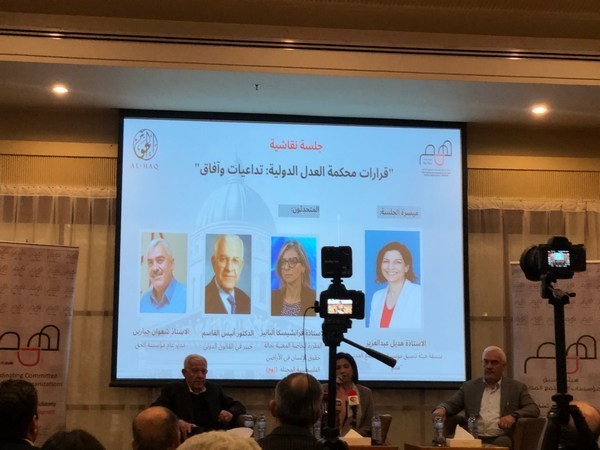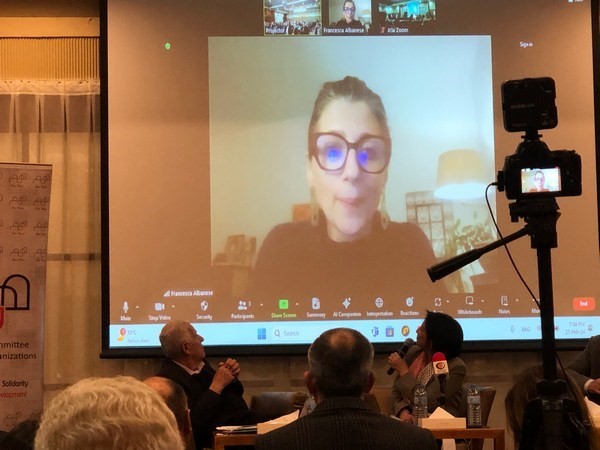AMMAN – A coordination body of civil society
institutions, Himam, in cooperation with the
Palestinian Right Foundation, held
a discussion session on Thursday titled "The Decisions of the
International Justice: Implications and Prospects." The session shed light
on the ramifications of the
International Court of Justice's (ICJ) decisions to
issue an advisory opinion on the practices of the Israeli occupation against
the Palestinian people in the West Bank and Gaza.
اضافة اعلان
This included the report expected to be
submitted by the state of Israel, the legal and humanitarian positions towards
them, and the implications and prospects that may emerge.
Himam's General
Coordinator, Hadeel Abdel-Aziz, emphasized that human dignity and rights are
inseparable and must be preserved in all areas and corners of the world. She
called for a departure from double and selective standards in implementing
human rights to align with the interests of the global political system.
Abdel-Aziz also highlighted that achieving justice locally is worth fighting
for.

International law expert Anis Al-Qassem
discussed the effectiveness of international law and the global rights system
in achieving justice. He pointed out that the problem lies not in the texts of
the law and international principles but in the selectivity in applying these
standards.
Qassem distinguished between
South Africa's lawsuit against Israel for committing genocide against Palestinians and the
interim measures it entailed and the ICJ's session to issue an advisory opinion
regarding the legal consequences of the Israeli occupation. He highlighted that
interim measures do not close the case but are decisions intended to prevent
irreparable damages. Yet, Israel has not complied with any of these interim
measures except for submitting a report on the measures it took to prevent genocide.
Qassem noted that "the
report was submitted to the ICJ in complete secrecy, contrary to the Court's tradition of
holding all its sessions and decisions openly. He also touched on the text of
the Convention on the Prevention of Genocide and its punishment, clarifying
that the Convention punishes not only the aggressor state but also all states
that incite genocide".

He stressed, "Humanitarian responsibility
lies not only on the aggressor state and those inciting genocide but on the
entire international community."
Special
Rapporteur on Human Rights in the
Occupied Palestinian Territories, Francisca
Albani, who participated online, stated that the crimes committed against the
Palestinian people in Gaza already amounted to genocide.
She
highlighted that "throughout history, genocide has been the prevailing
practice during colonial settlement of indigenous peoples. She explained that
colonial settlement is characterized by practices aimed at "suppressing
indigenous populations, racial segregation, displacement, ethnic cleansing, and
genocide." She commented that the international community's reluctance,
especially the West, stems from a deep-rooted cultural problem that believes the
only genocide in history was against Jews (the Holocaust). Albani also
criticized Israel for not complying with the
interim measures issued by the ICJ".
Albani condemned the reward for Israel's
non-compliance by the Western community in the decision to stop funding UNRWA,
considering its complicity with the aggressor state, Israel, particularly after
the issuance of interim measures that included allowing aid to reach the Gaza
Strip.
Director of the Palestinian Rights Foundation,
Shawan Jabarin, stated that "Israel's encouragement to commit war crimes
and crimes against humanity, leading to genocide, stems from its evading
responsibility since 1948. He emphasized that the international system is going
through a severe crisis, and its consequences do not concern Palestine alone
but the entire "international system."
Jabarin said," The history of the current
international system, which dates back to the end of World War II, forces
"everyone around the world to pay the price for ignoring international law
over the past consecutive years."
Jabarin outlined the role of the Palestinian
Rights Foundation in using local and international laws to try to prevent
genocide and hold those responsible for harming the Palestinian people
accountable.
He also noted, "The Palestinian Rights
Foundation works closely with South Africa in its case against Israel before
the ICJ, affirming that working in the field of human rights in times of
oppression and lawlessness requires effort and thorough research."
Jaberin concluded the session by calling for
ways to use local law, unions, and institutions to issue decisions and
regulations that encourage and allow national courts to pursue those accused of
genocide.
Jabarin praised the statements of international
institutions presented to the ICJ, such as the UN Secretary-General, the WHO,
Doctors Without Borders, and others.
The discussion session focused on three main
axes, including interim measures and the extent of Israel's compliance, the
responsibility and legal consequences for states to ensure they do not
participate in genocide and the role of human rights activists and civil
society in contributing to stopping genocide.
Read more Features
Jordan News



